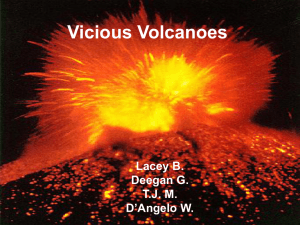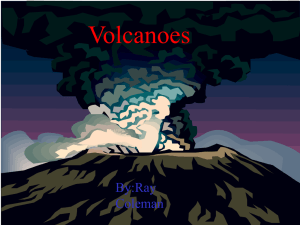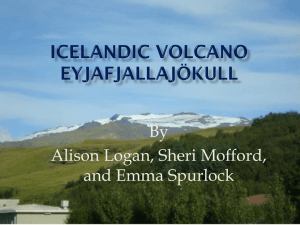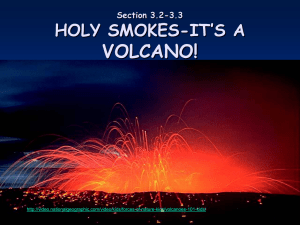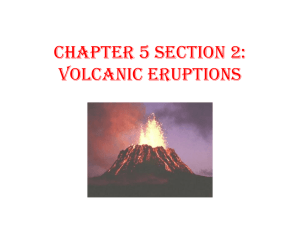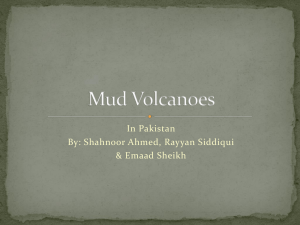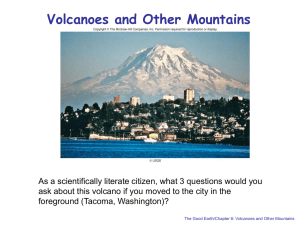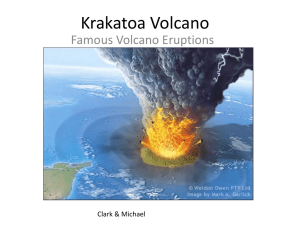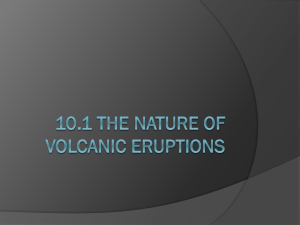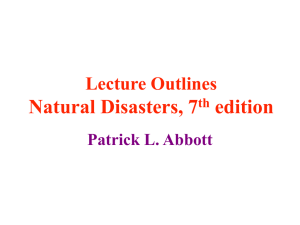How can Volcanologists predict eruptions
advertisement
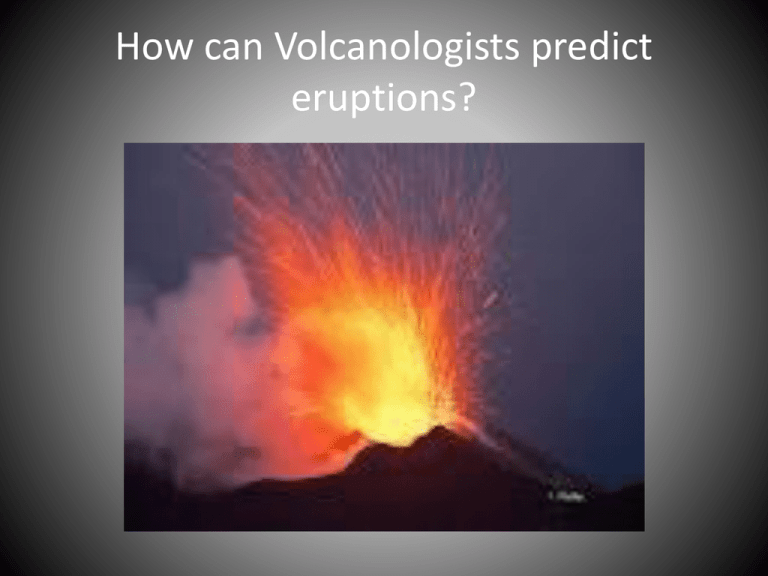
How can Volcanologists predict eruptions? What is a volcanologists job? • A volcanologist is a Scientist • It is known as volcanology • They collect samples to see how volcanoes work • When they know how volcanoes work they may be able to save lives What special equipment do volcanologists use? Seismic monitor Tiltmeter Protective suit Volcanologists need the best data collection devices and the best analysis tools to analyse the data collected. Thermal imager Thermocouple What special equipment do volcanologist use? • Face masks to avoid breathing toxic fumes • Metal shield to protect from the heat • To measure the temperature of lava flows, volcanologists use special thermometers called thermocouples that can withstand more heat. Regular thermometers would melt ! • Active volcanologists climb steep mountains to place earthquake measuring devices. Volcanologists will crawl into seething craters to collect rock and gas samples. Volcano Adventure Milestones 1) First person to abseil into active crater at Yasur Volcano, Vanuatu, while the volcano was erupting. Filmed for an award winning Discovery Channel documentary. 2) John's expedition was the first to the summit of Eyjafjallajokull volcano, Iceland during the 2010 eruption. 3) First scientist to climb to summit of Chaiten volcano in Chile in 2008 after the worlds largest rhyolite eruption in 100 years. Made 2 visits to the volcano in 2008. 4) First scientist to reach the largest eruption in the world in 2005 at Manam Volcano, Papua New Guinea. 5) Free-climbed 240m into the crater at Ambrym Volcano to study the lava lakes. 6) First person to climb into active crater at Gaua Volcano, Vanuatu. 7) One of the first people to climb to the summit of Ol Doinyo Lengai volcano, Tanzania after the large eruptions of 2007-2008. 8) In 2009 visited Central Island volcano in northern Kenya, a rarely visited active volcano in the world's largest desert lake. 9) In 2009, made rare visit to lava tubes of Suswa volcano, Kenya. 10) In 1999 made the closest approach ever to Stombolian eruptions inside the summit crater at Mt Etna volcano, Italy. These are only some of his milestones he has more! John Seach A leading expert in volcanology John is an Australian scientist and volcano adventurer. Over the last 22years he has travelled the world and seen eruptions on his visits to 200 volcanoes. Qualifications: Bachelor of Science, Chemistry (Sydney University 1983) Postgraduate Diploma in Nutrition and Dietetics (Sydney University 1984) Scuba Diving Instructor (PADI 1989current) Where are the world’s most active volcanoes? Mount Nyiragongo – Republic of Congo Chaitén - Chile Kīlauea - Hawaii Mount St Helens – Washington USA Sakurajima – Osumi Peninsula Japan Mayon - Philippines Popocatépetl Mexico Whakaari / White Island – New Zealand Mount Etna - Italy Soufrière Hills – Caribbean / Monsterrat Which eruption has killed the most people? The volcano eruption in Tambora, Indonesia, in 1815, killed around 92,000 people. The eruption sent fiery ash into the stratosphere, which cooled the world climate for more than a year. How do volcanologists know a volcano is going to erupt? Knowing when a volcano is going to erupt is very difficult. To predict eruptions volcanologists look for patterns, monitor volcanoes and collect data after a volcano has erupted. Volcanologists have learnt from information from Kilauea in Hawaii and used what they knew during the 1980 eruptions on Mt. St. Helens. When have volcanologists predicted an eruption and saved lives? Volcanologists study active volcanoes to predict when they will erupt. These professionals do actually save lives. In 1991, for example, volcanologists accurately predicted the eruption of Mount Pinatubo in the Philippines, enabling the safe evacuation of tens of thousands of residents. Why do volcanologists do such a dangerous job? Most volcanologists seem to really like being in the outdoors and start off studying other things first before they work on volcanoes. They think that volcanoes are amazing but they don’t like that they hurt people. They do like that they can help people. Volcanologists are definitely adventurous people! The job of a volcanologist is an important one so that we can understand volcanoes better. Then we can save more lives. The sad thing is that about one volcanologist dies every year. Bibliography • • • • • • www.news.bbc.co.uk/cbbcnews/high/find_out/guides/tech/volcanoes/newsid_17 68000/1768629.stm www.listphobia.com/2010/05/02/10-most-dangerous-active-volcanoes-in-theworld http://news.stanford.edu/pr/00/aguvolcano110.html www.volcanoworld.wordpress.com/2009/03/06/how-do-volcanologists-predictvolcanic-eruptions/ http://www.volcanolive.com/ www.plate-tectonics.org/volcanoes/volcanologist-at-work.html
